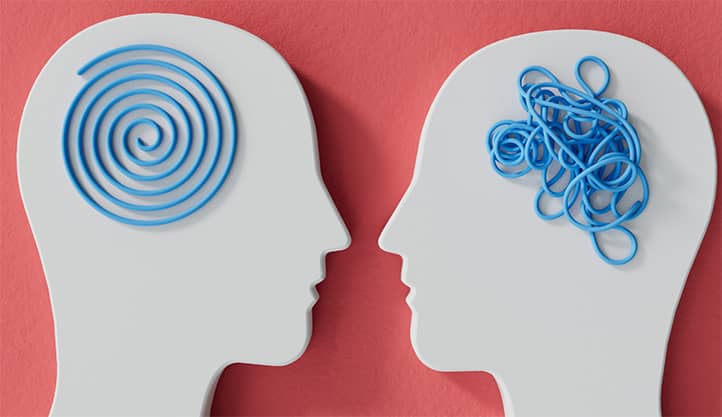Rational thinking is the ability to think logically, objectively, and without excessive influence from emotions. It allows us to analyze information, weigh facts, and make thoughtful decisions, even in complex or stressful situations.
In the modern world, where we are constantly exposed to a vast flow of information, opinions, and emotional triggers, rational thinking has become not just a useful skill but a necessary tool for maintaining mental clarity and effectiveness. It helps us filter out noise, separate the important from the trivial, and avoid impulsive actions that often lead to disappointment.
However, many of us live and act on “autopilot”—a mode in which decisions are made automatically, without deep analysis or awareness. This happens due to habits, stereotypes, and cognitive biases that our brain uses to conserve energy.
For example, impulsive purchases made under the influence of momentary emotions, or emotional outbursts when we react to a situation without taking the time to think it through, are all results of autopilot. Even stereotypical thinking, where we judge people or events through the lens of preconceptions, is a consequence of automatic reactions that simplify our lives but often distort reality.
The problem is that this mode of thinking can lead to mistakes, conflicts, and ineffective decisions. We miss opportunities because we don’t consider alternatives, or we fall into traps of manipulation because we don’t critically analyze information.
This is where rational thinking comes to the rescue—as a way to step out of automatic mode and start acting consciously. It not only helps us make more informed decisions but also reduces stress levels, as understanding what is happening and why makes the world more predictable and manageable.
Thus, rational thinking is not just an abstract concept but a practical tool that can change how we live, work, and interact with others.

Why Do We Act on Autopilot?
Our brain is an incredibly complex and efficient mechanism that is evolutionarily tuned for survival. However, its efficiency often comes at the cost of simplifications that can hinder our ability to think rationally and consciously. When acting on autopilot, we rely on automatic reactions, patterns, and habits that help save energy and time. But this “efficiency” has a downside: we become less flexible, make more mistakes, and miss opportunities for growth. To understand why this happens, we need to examine the main reasons that push us into autopilot mode.
Evolutionary Reasons
One of the main reasons we act on autopilot lies in our evolutionary history. The human brain consumes a tremendous amount of energy. To optimize resources, it has developed mechanisms to minimize effort when performing routine tasks. For example, when we learn to drive a car, we initially have to concentrate on every action: how to shift gears, how to turn the wheel, how to watch the road. But over time, these actions become automatic, and we can drive almost without thinking. This is autopilot—a set of patterns that the brain uses to simplify life.
However, such patterns don’t only apply to simple situations. They also influence our thinking and decision-making. For instance, when faced with a new task, the brain looks for similar situations in the past and offers ready-made solutions. This is useful if the situation truly repeats itself, but it can be dangerous if circumstances have changed. Thus, autopilot is a result of evolutionary adaptation that once helped us survive but can now hinder us in the modern world.
The Role of Emotions
Emotions play a huge role in how we think and act. They evolved as a mechanism for quickly responding to danger or opportunities. For example, fear makes us instantly recoil from fire, while joy motivates us to repeat actions that bring pleasure. However, in complex situations, emotions can take control and interfere with rational analysis.
When we experience strong emotions such as anger, fear, or anxiety, the limbic system of the brain, which is responsible for emotional reactions, becomes activated. At this moment, the prefrontal cortex, responsible for logical thinking and decision-making, temporarily “shuts down.” As a result, we act impulsively, without considering the consequences. For instance, in the heat of an argument, we might say something hurtful that we later regret, or under the influence of fear, we might turn down a promising project. Emotions are a powerful driver, but without control, they can lead us far from rational thinking.
Cognitive Biases
Cognitive biases are systematic errors in thinking that distort our perception of reality. They arise because the brain tries to simplify information processing, but as a result, we start seeing the world not as it really is. One of the most common biases is catastrophizing, where we tend to exaggerate the negative consequences of events. For example, if we’re not invited to a meeting, we might think that we’re no longer valued at work, even though the reason might be much simpler.
Another common bias is black-and-white thinking, where we see only extremes: all or nothing, success or failure. This prevents us from noticing nuances and seeking compromises. Overgeneralization is also frequent, where we make broad conclusions based on a single case. For instance, if one project fails, we might decide that we’ll never succeed. These biases force us to act on autopilot, relying on false beliefs instead of analyzing situations objectively.
Habits and Social Stereotypes
Habits are another powerful factor that drives automatic behavior. They form when we repeat the same actions in similar situations and, over time, become so ingrained that we stop noticing them. For example, many of us start the day with a cup of coffee without even thinking about whether we really need it. Habits save energy, but they can also limit our freedom of choice.
Social stereotypes also play a significant role. We often act “like everyone else” or “as is customary” because it feels safe and approved. For instance, we might choose a profession considered prestigious, even if it doesn’t interest us, or follow fashion trends to fit in. These stereotypes are shaped by society, culture, and upbringing, and they can severely limit our thinking. When acting on autopilot, we often simply repeat what others do, instead of asking ourselves, “Is this really what I want?”
Thus, autopilot is the result of a complex interplay of evolutionary mechanisms, emotions, cognitive biases, and social influences. Understanding these reasons helps us realize why we often act automatically and what we can do to regain control over our thoughts and decisions.

What Makes Thinking Rational?
Rational thinking is not just the ability to reason logically; it is a comprehensive set of skills that enable us to make thoughtful, well-founded, and effective decisions. Unlike emotional or impulsive thinking, rational thinking is built on clear principles that help us see the world as it is, rather than as we imagine or wish it to be. It requires discipline, mindfulness, and a willingness to question our beliefs. But what exactly makes thinking rational? Let’s break it down.
Reliance on Facts, Logic, and Objectivity
The foundation of rational thinking lies in facts, not assumptions, opinions, or emotions. Facts are objective data that can be verified and confirmed. For example, if we want to understand whether a new diet is effective, we should examine scientific studies rather than relying on online reviews or advice from friends. Rational thinking demands that we always seek evidence and verify its reliability.
Logic is the tool that helps us connect facts into coherent chains. It allows us to draw conclusions that align with reality rather than contradict it. For instance, if we know that all humans are mortal (fact) and that Socrates is a human (fact), we can logically conclude that Socrates is mortal. Logic helps us avoid contradictions and find connections between phenomena.
Objectivity is the ability to consider a situation impartially, without the influence of personal biases or emotions. Rational thinking requires us to acknowledge our limitations and be willing to change our opinions if new facts contradict our beliefs. For example, if we think we dislike someone but later learn they have done something good, rational thinking would prompt us to reconsider our attitude.
The Ability to Separate Emotions from Analysis
Emotions are an important part of life, but they often interfere with rational thinking. When we experience strong emotions like anger, fear, or joy, our perception of reality can become distorted. For instance, in a state of anger, we may exaggerate the negative aspects of a situation, while in a state of euphoria, we may underestimate risks. Rational thinking requires us to learn how to separate emotions from analysis.
One way to achieve this is by using mindfulness techniques. For example, when we feel overwhelmed by emotions, we can pause, take a deep breath, and ask ourselves: “What am I feeling right now?”, “Why am I reacting this way?”, “How are my emotions influencing my perception of the situation?”. This helps us “distance” ourselves from our emotions and view things more objectively.
Another important aspect is the ability to acknowledge our emotions without letting them dictate our decisions. For instance, if we feel anxious about public speaking, rational thinking would remind us that this fear is natural but should not prevent us from speaking. We can use logic to remind ourselves that we are well-prepared and that the audience is likely to be supportive.
Rational thinking is not just the ability to think; it is a set of skills that help us make decisions based on facts, logic, and objectivity, rather than being influenced by emotions or biases. It requires constant self-improvement, but the results—clarity of mind, confidence in our decisions, and the ability to effectively handle challenges—are well worth the effort.

The Benefits of Rational Thinking
Rational thinking is not just an intellectual exercise; it is a powerful tool that can significantly improve the quality of life. It helps us make more thoughtful decisions, manage emotions, resist manipulation, and live more consciously. In a world filled with information overload, stress, and societal pressure, rational thinking serves as an “anchor” that helps us maintain stability and mental clarity. Let’s explore its benefits in detail.
More Thoughtful Decisions
One of the main advantages of rational thinking is the ability to make thoughtful and well-founded decisions. When we think rationally, we don’t rely on intuition or emotions but instead carefully analyze facts, consider alternatives, and evaluate potential consequences. For example, when choosing a job, a rational approach involves analyzing not only the salary but also working conditions, growth opportunities, corporate culture, and other factors. This helps us avoid impulsive decisions that we might later regret.
Rational thinking also helps us avoid cognitive biases, such as excessive optimism or pessimism. For instance, instead of thinking, “I’ll never succeed,” we can ask ourselves, “What specific steps can I take to achieve success?” This makes our decisions more realistic and attainable.
Reduced Stress and Anxiety
Stress and anxiety often arise from uncertainty and a sense of losing control. Rational thinking helps manage these states by allowing us to structure information and find logical explanations for what is happening. For example, if we’re worried about potential job loss, a rational approach would prompt us to think: “Yes, the situation is difficult, but I can create an action plan: update my resume, start looking for new job openings, take additional courses.” This reduces feelings of helplessness and restores a sense of control.
Moreover, rational thinking helps us distinguish real problems from imagined ones. For instance, instead of worrying, “What if I’m late for the meeting?”, we can ask ourselves, “How likely is this to happen? What can I do to minimize the risks?” This approach reduces anxiety and helps us focus on solving specific tasks.
The Ability to Resist Manipulation
In the modern world, we are constantly exposed to attempts to manipulate our opinions and behavior—whether through advertising, political slogans, or social pressure. Rational thinking helps us recognize such attempts and defend against them. It teaches us to ask questions like: “Who is behind this information?”, “What are their goals?”, “What evidence are they providing?”
For example, if we are offered a “miracle” weight-loss product, a rational approach would prompt us to examine the product’s ingredients, read reviews from independent experts, and check whether there is scientific research supporting its effectiveness. This helps us avoid unnecessary expenses and disappointments.
How Rational Thinking Promotes a More Conscious Life
Rational thinking is not just a tool for solving specific problems; it is a way to live more consciously. It helps us better understand ourselves, our goals, and our values, and make decisions that align with our true needs. For instance, instead of acting on autopilot—staying in a job we dislike, maintaining toxic relationships, or spending time on meaningless activities—we can ask ourselves: “Is this really what I want? What can I change to live a more fulfilling life?”
For example, when faced with a conflict, instead of reacting impulsively—yelling, blaming, or avoiding the conversation—rational thinking would prompt us to pause, analyze the situation, and find a constructive solution. We might say, “I understand you’re upset; let’s discuss how to resolve this issue.” This approach not only helps preserve relationships but also makes life more harmonious.
Rational thinking offers numerous benefits: from more thoughtful decisions and reduced stress to the ability to resist manipulation and live consciously. It helps us not only cope with difficulties but also find opportunities for personal growth and development. By cultivating this skill, we become more confident, resilient, and effective in every area of life.

Practical Steps to Develop Rational Thinking
Rational thinking is a skill that can be developed with effort and by following certain principles. It requires not only intellectual work but also mindfulness, discipline, and a willingness to question one’s beliefs.
Mindfulness is the foundation upon which rational thinking is built. It helps us slow down, pay attention to our thoughts and emotions, and understand how they influence our decisions. Without mindfulness, we often operate on autopilot, unaware that our reactions may be irrational or ineffective.
Questions to Ask Yourself
Rational thinking requires constant analysis of one’s thoughts and beliefs. To achieve this, it is important to ask yourself the right questions, which help identify weaknesses in your thinking and find more objective answers.
Examples of questions:
- “Why do I think this way?” This question helps you understand the basis of your beliefs. For example, if you think you can’t handle a task, ask yourself: “Why do I think this? Is this just an unfounded fear?”
- “What evidence do I have?” This question helps separate facts from assumptions. For example, if you think someone dislikes you, ask yourself: “What specific actions or words confirm this?”
- “What might I be missing?” This question helps avoid a narrow view of the situation. For instance, if you’re confident your plan is perfect, ask yourself: “What risks have I overlooked? What alternatives have I not considered?”
Addressing Cognitive Biases
Cognitive biases are thinking errors that distort our perception of reality. They hinder rational thinking because they force us to see the world through the lens of stereotypes, emotions, and prejudices.
How to identify and correct thinking errors:
- Learn about common cognitive biases. For example, catastrophizing (exaggerating negative consequences), black-and-white thinking (seeing only extremes), and overgeneralization (making broad conclusions based on a single case).
- Analyze your thoughts. When you notice strong emotions, ask yourself: “What bias might be behind this reaction?” For instance, if you feel like “everything is ruined,” this might be catastrophizing.
- Seek alternative explanations. For example, if you think someone is intentionally ignoring you, consider: “Maybe they’re just having a bad day?”
Developing Critical Thinking
Critical thinking is the ability to analyze information, assess its reliability, and seek alternative perspectives. It helps us avoid taking things at face value and make well-founded conclusions.
How to develop critical thinking:
- Analyze sources of information. Before trusting a claim, ask yourself: “Who said this? What are their motives? Do they have evidence?”
- Seek alternative viewpoints. For example, if you read an article supporting one perspective, look for materials presenting the opposite position.
- Ask questions. For instance, “What does this mean?”, “Why is this important?”, “What evidence is there?”
Managing Emotions
Emotions are an important part of life, but they often interfere with rational thinking. Managing emotions helps us maintain clarity of mind and make thoughtful decisions even in stressful situations.
How to prevent emotions from influencing decisions:
- Acknowledge your emotions. For example, if you feel angry, tell yourself: “I’m angry, and that’s okay, but I shouldn’t act on this feeling.”
- Use relaxation techniques. For instance, deep breathing or progressive muscle relaxation can help reduce stress and regain control over emotions.
- Delay decisions. If you feel overwhelmed by emotions, give yourself time to cool down. For example, say: “I’ll make a decision tomorrow when I’m calmer.”
Developing rational thinking is a process that takes time and effort, but the results are worth it. Mindfulness, asking the right questions, addressing cognitive biases, critical thinking, and managing emotions all help us become more resilient, confident, and effective in any area of life.
Start small: for example, ask yourself one of the listed questions each day or analyze one of your beliefs. Gradually, these steps will become habits, and you’ll notice your thinking becoming clearer and more rational.

How to Apply Rational Thinking in Everyday Life
Rational thinking is not just a theoretical concept but a practical tool that can and should be used in everyday life. It helps us make more thoughtful decisions, resolve conflicts, improve relationships, and achieve goals. However, for rational thinking to become a part of our lives, it’s important to learn how to apply it in specific situations.
The “STOP” Technique
The “STOP” technique is a simple yet effective way to slow down your reactions and make more deliberate decisions. It is particularly useful in stressful or emotionally charged situations where the risk of acting impulsively is high.
How to apply it:
- S — Stop and tell yourself: “Stop, I’m getting too emotional.”
- T — Take a breath, pause, and calm yourself.
- O — Observe by asking: “Why am I angry? What do I want to achieve in this conversation?”
- P — Proceed by deciding: “I’ll continue the conversation calmly and try to find a compromise.”
Example: During an argument with your partner, you feel the urge to say something hurtful. Instead, you pause, analyze your emotions, and decide to take a break to discuss the issue later when emotions have settled.
Keeping a Reflection Journal
A reflection journal is a powerful tool for developing mindfulness and rational thinking. It helps you better understand your thoughts, emotions, and behaviors, as well as identify patterns that may hinder rational decision-making.
How to apply it:
- Write down your thoughts. Dedicate 10-15 minutes each day to jot down what’s bothering you, the decisions you’ve made, and why.
- Analyze your entries. Ask yourself: “Why did I act this way?”, “What emotions influenced my decision?”, “What could I do differently next time?”
- Look for patterns. For example, you might notice that you often make impulsive decisions when tired or stressed.
Example: You notice that you often snap at colleagues when you’re overwhelmed with work. By analyzing your journal entries, you realize this happens due to exhaustion. As a result, you decide to delegate tasks and take more breaks.
Meditation and Mindfulness
Meditation and mindfulness practices help develop the ability to observe your thoughts and emotions without getting caught up in them. This leads to clearer and more rational thinking.
How to apply it:
- Start small. Dedicate 5-10 minutes a day to meditation. Focus on your breathing and observe your thoughts without trying to change them.
- Practice mindfulness in daily life. For example, when eating, focus on the taste and texture of the food rather than your thoughts.
- Use mindfulness to manage emotions. When you feel emotions overwhelming you, pause and focus on your breathing.
Example: You feel anger rising toward a colleague. Instead of reacting immediately, you pause, focus on your breathing, and then calmly express your opinion.
Gradually Changing Habits
Rational thinking is a skill that develops gradually. Start with small changes in your habits, and over time, you’ll notice your thinking becoming clearer and more deliberate.
How to apply it:
- Identify your “autopilot” habits. For example, you might notice that you often make decisions under the influence of emotions or stereotypes.
- Take it step by step. Each day, ask yourself one of the questions that promote rational thinking: “Why do I think this way?”, “What evidence do I have?”
- Track your progress. Write down how your thinking and behavior change over time.
Example: You notice that you often buy unnecessary things under the influence of advertising. You decide to ask yourself before each purchase: “Do I really need this?” and wait 24 hours before making a decision.
Real-Life Examples
Rational thinking can be useful in a variety of situations—from conflicts to career planning. Here are a few examples of how it can be applied:
- In conflicts. Instead of reacting emotionally, you analyze the situation, ask questions, and seek a compromise.
- At work. You use rational thinking for decision-making, planning, and time management. For example, before starting a new project, you analyze all possible risks and create a detailed action plan.
- In personal relationships. You learn to separate your emotions from analysis and make decisions that strengthen relationships. For instance, instead of blaming your partner, you say: “I think we’re both tired; let’s find time to rest.”
By applying these techniques and practices, you can integrate rational thinking into your daily life, leading to better decisions, improved relationships, and greater personal growth.

Conclusion
Rational thinking is not just a useful skill but a necessity in today’s world, where we are surrounded by an overwhelming flow of information, stress, and constant changes. It helps not only in making more balanced and well-founded decisions but also in managing emotions, avoiding manipulation, and living more consciously.
In an era where the pace of change is accelerating and uncertainty is becoming the norm, rational thinking serves as a key tool for adaptation and success. It allows us to maintain mental clarity even in the most challenging situations, find optimal solutions, and act with confidence.
The benefits of rational thinking are evident: it helps reduce stress, avoid impulsive mistakes, improve relationships with others, and achieve set goals. But most importantly, it gives us control over our own lives.
When we think rationally, we stop being hostages to emotions, stereotypes, and automatic reactions, and we start seeing the world as it is, rather than as we imagine or wish it to be. This makes us more resilient, confident, and effective.
But how can one begin developing this skill? Start small. Become aware of your thoughts, ask yourself questions, analyze your beliefs and emotions. Don’t try to change everything at once—small steps can lead to significant transformations. For instance, take a few minutes each day to write down your thoughts or reflect on why you react to certain situations in a particular way. Gradually, this will become a habit, and you’ll notice how your thinking becomes clearer and more rational.
Recommended Reading
- Daniel Kahneman, Thinking, Fast and Slow
This book is a true classic in the field of cognitive psychology. Nobel laureate Kahneman explains how our two thinking modes work: fast (intuitive) and slow (analytical). It will help you understand how to avoid errors caused by cognitive biases. - Richard Paul, Linda Elder, Critical Thinking: Tools for Taking Charge of Your Learning and Your Life
A practical guide to developing critical thinking. The authors provide specific tools and exercises to help analyze information, ask the right questions, and make well-reasoned decisions. - Nassim Nicholas Taleb, The Black Swan: The Impact of the Highly Improbable
A book about how we underestimate the role of random and unpredictable events in our lives. Taleb teaches how to think more flexibly and be prepared for uncertainties, which is a crucial part of rational thinking. - Carol S. Dweck, Mindset: The New Psychology of Success
This book explores how our mindset affects success. Dweck explains the difference between a fixed and a growth mindset and demonstrates how developing the latter can make us more adaptive and rational. - Rolf Dobelli, The Art of Thinking Clearly
In this book, the author examines 99 cognitive biases that hinder rational decision-making. Each chapter is dedicated to a specific thinking error and ways to overcome it. - Julia Galef, The Scout Mindset: Why Some People See Things Clearly and Others Don’t
A book about developing the ability to see the world objectively, free from biases and emotions. Galef offers practical advice on cultivating rational thinking.




